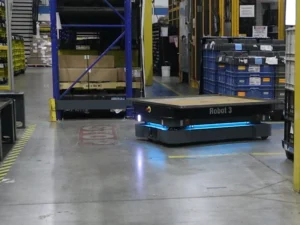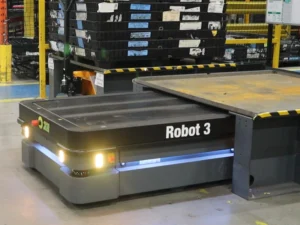The Future of Automation: Exploring the Benefits of AMR Technology
In the constantly evolving landscape of technology and automation, AMRs (Autonomous Mobile Robots) have emerged as a huge game-changer. These intelligent, self-navigating machines are revolutionizing various industries by enhancing efficiency, safety, and adaptability. Want to understand why they are becoming an indispensable part of modern operations? Continue reading as we outline the various benefits, such as, increased efficiency, improved safety, cost savings, flexibility, data collection, sustainability, and overall customer experience.
1. Enhanced Efficiency and Productivity
AMRs are designed to optimize workflows and reduce the time and effort required for various tasks. Unlike traditional robots that follow fixed paths (i.e., Automated Guided Vehicles), AMRs use advanced sensors, cameras, and AI algorithms to navigate dynamically within their environment. This capability allows them to:
· Adapt to Changes: AMRs can quickly adjust their routes and tasks based on real-time data, minimizing downtime and ensuring continuous operation even in changing environments.
· Perform Complex Tasks: From transporting goods within a warehouse to assisting in assembly lines, AMRs can handle diverse and complex tasks, boosting overall productivity.
2. Improved Safety
Safety is a significant concern in any industrial setting. AMRs contribute immensely to creating a safer work environment through:
· Collision Avoidance: Equipped with sophisticated sensors and AI, AMRs can detect obstacles and navigate around them, reducing the risk of accidents and injuries.
· Human-Robot Collaboration: AMRs can work alongside human employees without posing safety risks, thanks to their ability to understand and react to human presence and movements.
3. Cost Savings
Investing in AMRs can lead to substantial cost savings in the long run. Here’s how:
· Reduced Labor Costs: By automating repetitive and labor-intensive tasks, companies can reallocate their human workforce to more value-added activities, thereby reducing labor costs.
· Lower Maintenance Costs: AMRs typically require less maintenance compared to traditional automated systems. Their ability to operate autonomously and adaptively also means fewer disruptions and maintenance needs.
4. Scalability and Flexibility
One of the standout benefits of AMRs is their scalability and flexibility. This includes:
· Easily Scale Operations: As demand grows, additional AMRs can be seamlessly integrated into existing operations without major infrastructural changes.
· Flexible Deployment: AMRs can be deployed across various environments and industries, from manufacturing and warehousing to healthcare and hospitality, making them a versatile solution for different needs.
5. Data Collection and Analysis
AMRs are not just about moving goods from point A to point B. They also play a crucial role in data collection and analysis:
· Real-Time Data: AMRs collect data on their operations, providing valuable insights into workflow efficiencies, bottlenecks, and areas for improvement.
· Predictive Maintenance: By analyzing data patterns, AMRs can predict when maintenance is needed, preventing unexpected breakdowns and optimizing operational uptime.
6. Environmental Sustainability
AMRs contribute to environmental sustainability by:
· Energy Efficiency: Modern AMRs are designed to be energy-efficient, reducing the overall carbon footprint of automated operations.
· Optimized Resource Use: By improving operational efficiency, AMRs help in better resource management, reducing waste and enhancing sustainability practices.
7. Enhanced Customer Experience
In customer-facing industries, AMRs can significantly enhance the customer experience:
· Faster Service: AMRs can assist in faster delivery of services, from stocking shelves to room service delivery, leading to higher customer satisfaction.
· Innovative Engagements: AMRs can engage customers in unique ways, offering personalized assistance and improving overall customer interaction and experience.
Conclusion
The adoption of Autonomous Mobile Robots is transforming industries by offering numerous benefits, from enhanced efficiency and safety to cost savings and improved customer experiences. As technology continues to advance, the capabilities of AMRs will only expand, making them an integral part of the future of automation. Businesses looking to stay competitive and innovative should consider integrating AMRs into their operations to harness these benefits and drive long-term success.
Featured robots in this article: Mobile Industrial Robots – Automate your internal transportation

